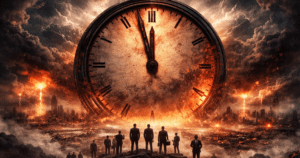The war in Gaza, now deep into its second year, has pulled back the curtain on a profound internal crisis within Israel’s own power elite. Far from the image of a tightly coordinated national security state, Israel today appears fractured at its highest levels, with political leaders, intelligence chiefs, military commanders, and segments of civil society openly at odds. This elite infighting, unprecedented in both intensity and visibility, reveals a battle not only over wartime strategy, but over the very future of Israel’s approach to the Palestinian crisis — a reality laid bare in a recent analysis by Dr. Ramzy Baroud.
A Government at War with Itself
At the center of this internal turmoil stands Prime Minister Benjamin Netanyahu, whose leadership has come under fire from nearly every institutional corner of Israeli power. Once the undisputed linchpin of Israel’s political system, Netanyahu is now being described by current and former insiders as a destabilizing force. His refusal to consider ceasefire proposals or secure hostage releases is seen by many Israelis as politically motivated — designed to delay trials on corruption charges and cling to power, regardless of the national cost.
This perception has galvanized resistance not just among civilians, but among Israel’s top military and intelligence echelons. The release of a humiliating video — aired by Channel 12 — showing Israeli soldiers in disarray under attack by a lone Palestinian fighter in Khan Yunis, signaled a stark break from customary military censorship. It was, by many interpretations, less a lapse in security and more a calculated blow in a domestic psychological war: one elite faction exposing the government’s incompetence or dishonesty to trigger public outrage.
Intelligence Breaks Ranks
The Shin Bet, Israel’s notoriously secretive internal intelligence agency, has joined the ranks of Netanyahu’s critics in unprecedented fashion. Its current chief, Ronen Bar, submitted testimony to the High Court suggesting that he was dismissed for refusing to shield the Prime Minister from legal scrutiny — particularly regarding Netanyahu’s aides and personal trial obligations. Bar’s public defiance marks a staggering breach of protocol and signals coordinated resistance within the intelligence community.
Former Shin Bet head Nadav Argaman has gone even further, openly threatening to reveal sensitive information if Netanyahu continues to act unlawfully. Such statements are unheard of in Israel’s security circles, where silence and loyalty once defined elite norms.
Military Mutiny in Slow Motion
Former Defense Minister Yoav Gallant, himself under ICC scrutiny, has also emerged as a vocal critic. In what amounted to a public rebuke, he accused Netanyahu of engineering false military narratives — including fabricated tunnel photos — to justify the continuation of the war. Gallant’s assertion that such deceptions were used to block ceasefire agreements represents a direct challenge to the legitimacy of the entire war strategy.
Perhaps even more alarming for Israel’s defense establishment is the mass refusal of military reservists to return to duty. Leaks from within the IDF suggest that nearly half of Israel’s reserves are resisting redeployment. Meanwhile, newly appointed Chief of Staff Eyal Zamir, a Netanyahu loyalist, shocked observers when he revealed that nearly 6,000 Israeli families had been added to the list of bereaved in 2024 — a number that hints at far greater military losses than previously disclosed.
Cracks in the Ideological Edifice
These developments suggest more than just political turbulence; they represent a crisis of legitimacy across Israel’s institutional core. For decades, Israel projected an image of resilience and unity, of a modern democratic bastion amid regional instability. But the open rupture between elites — combined with the global outcry over the humanitarian crisis in Gaza — is forcing a reevaluation of this long-cultivated identity.
As elites accuse each other of moral betrayal and institutional sabotage, their internal battles are exposing the contradictions that underpin Israel’s security state. Gallant’s endorsement of civil disobedience against Netanyahu, once unthinkable from a sitting defense official, illustrates how deeply the rift has grown. This is not simply a partisan disagreement — it is a battle for institutional control and national narrative.
A Final Note
The internal rupture among Israeli elites does not merely signal a domestic political crisis; it sheds light on the deeper contradictions that have long underpinned Israel’s approach to the Palestinian issue. As military, intelligence, and political leaders turn against each other, what emerges is a portrait of a state struggling to reconcile its foundational narratives with the moral and strategic consequences of its actions in Gaza.
The fractures within Israel’s power centers inadvertently expose the costs — political, ethical, and human — of a prolonged occupation and recurring military campaigns. Rather than consolidating national purpose, the Gaza war has forced a reckoning with how unsustainable the status quo has become, not only for Palestinians under siege but for a system that can no longer contain the contradictions it has helped to engineer.















